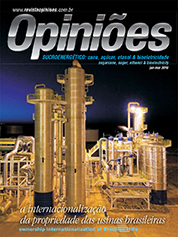Marcelo Weyland Barbosa Vieira
Director of Sugar and Ethanol at Adecoagro Brasil
Op-AA-23
International capital: consolidation opportunities for Brazilian leadership in biofuels
Foreign investment in the sugar and ethanol industry is not exactly a novelty, given that we have had important producers such as Sucrerie Française and Deltec, with mills in São Paulo and Rio de Janeiro states. However the sugar export monopoly of the Sugar and Ethanol Institute (“IAA”) scared off these investors who got rid of their assets in Brazil.
Following the industry’s deregulation with the extinction of the IAA, the stabilization of our economy and its increased opening and, more recently, the growing global interest in the production of biofuels, what we see is the return of international capital investing in our industry. It is the world’s most competitive, given the favorable environment and the long-lasting qualification of our farmers.
The ideal combination of good climate, proper soil quality and topography favoring mechanization is inexistent anywhere else in the world, spreading over an area the size of Center-South Brazil. Our domestic market that allows producers a good mix of sugar, ethanol and cogeneration, makes us the lowest cost producers. Our industry lacks a good capital structure.
Traditionally, this industry has been dominated by family-run businesses and its focus on wealth accumulation results in a continuous quest for incremental expansion without adequate capitalization. Decades of high inflation and economic instability have exacerbated this trend. Given the nature of the production of commodities, with price volatility, the lack of credit to finance regulatory inventory and financial fragility of many of the producers, recurring crises are caused in times when supply exceeds demand.
In addition, succession in older companies results in widespread ownership, causing loss of interest in the business on the part of minority shareholders, who take no part in running a company. In recent years this scenario resulted in a great number of mergers and acquisitions in the industry. This trend towards consolidation of the industry, which is not peculiar only to agroindustry, but rather to all industries in emerging economies, resulted in the growth of professionally managed companies with focus on a business’ profitability, achieved through new projects and acquisitions.
Economies of scale bring about competitiveness and allow access to international capital at much lower costs than in the Brazilian market. This new type of sugar producing company has attracted the attention of foreign investors, interested in the growing demand for food and in the huge market potential of the world’s biofuels market in the long term.
We have seen criticism from leftist politicians who in this movement see a threat to family-run agricultural businesses. However, the new emerging companies are not focused on acquiring land, but rather on growing through the leasing mainly of low-productivity areas used for cattle breeding. The production of sugarcane is not an adequate activity for family-owned properties, given the need for economies of scale in the mechanization of operations, a requirement of environmental legislation, which foresees an end to the burning of sugarcane straw prior to harvesting.
Manual harvesting is becoming more expensive with the country’s growth and the increasing cost of labor. International companies are strongly oriented towards operations’ sustainability requirements, with a high standard of social responsibility, lacking which, access to capital of major investors is not easily achievable. Brazil needs to take advantage of the enormous availability of international capital to more quickly develop this tremendous potential of our agriculture.
It is a great opportunity to potentialize the excellence of our operators, the unchallenged leaders of global agroindustry. The important novelty is the entry of major commodity traders and fuel companies that start to integrate production with logistics and distribution, making the Brazilian product much more competitive internationally.
The participation of large international companies in our business will certainly, to some degree, facilitate the opening of new markets for our products. We have the natural conditions needed to be the low cost producers: we have companies with excellent operational management, and we are leaders in technology – what we lack is disseminating the concepts involving the focus on the bottom line, on company capitalization, on ROIC.
The participation of large Brazilian or internationally controlled companies, in combination with good local teams and increased focus on a business’ final result, brings about a new standard of excellence that in the long term will spread throughout our industry, consolidating our leading position in the world production of renewable energy.




